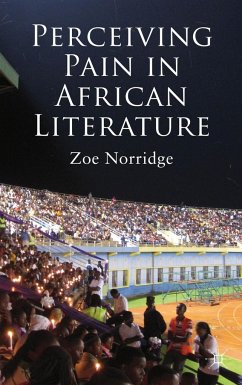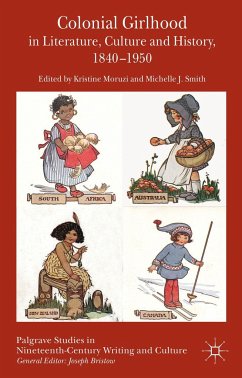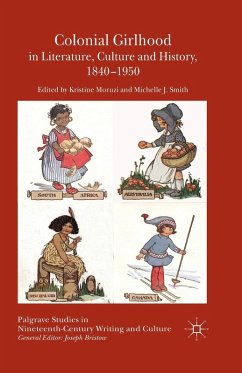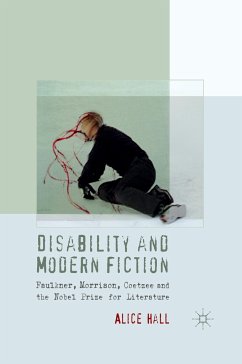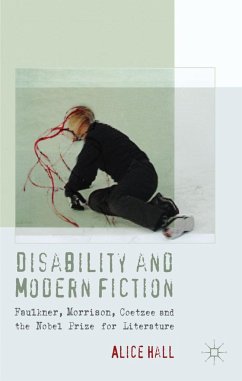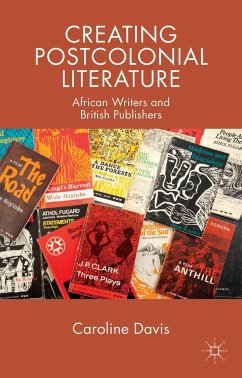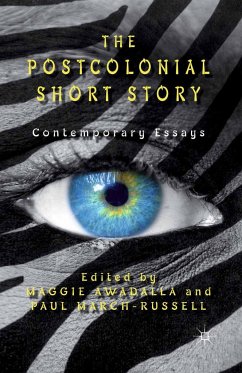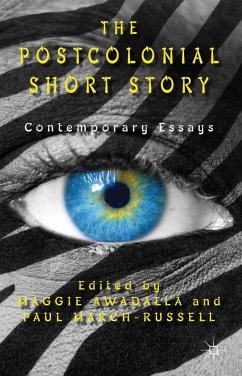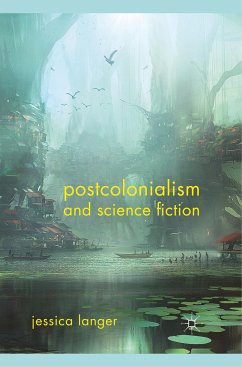
Z. Norridge
Broschiertes Buch
Perceiving Pain in African Literature
Versandkostenfrei!
Versandfertig in 6-10 Tagen
Weitere Ausgaben:

PAYBACK Punkte
19 °P sammeln!





An analysis of literary accounts of suffering from sub-Saharan Africa, this book examines fiction and life-writing in English and French over the last forty years. Drawing on writers from the canonical to the less well-known, it uses close readings to examine the personal, social and political consequences of representing pain in literature.
Zoe Norridge is a Lecturer in English and Comparative Literature at King's College London, UK. She has also taught African and Global Literature at the University of York, University of Oxford and the School of Oriental and African Studies. In 2011 she was named one of ten BBC Radio 3 and AHRC New Generation Thinkers.
Produktdetails
- Verlag: Palgrave Macmillan / Palgrave Macmillan UK / Springer Palgrave Macmillan
- Artikelnr. des Verlages: 978-1-349-34963-0
- 1st ed. 2013
- Seitenzahl: 248
- Erscheinungstermin: 1. Januar 2013
- Englisch
- Abmessung: 216mm x 140mm x 14mm
- Gewicht: 316g
- ISBN-13: 9781349349630
- ISBN-10: 1349349631
- Artikelnr.: 45082372
Herstellerkennzeichnung
Springer-Verlag GmbH
Tiergartenstr. 17
69121 Heidelberg
ProductSafety@springernature.com
"A wide-ranging scrutiny of the ethics and aesthetics of representing pain in narrative, this thought-provoking study extends the geographical remit of trauma studies and the conceptual underpinnings of 'African literature'." Ranka Primorac, Lecturer, University of Southampton, UK
"Zoe Norridge has given us an extraordinarily rich, insightful and often moving account of the depiction of pain in narratives by African writers, exploring literature's ability to do justice to the experience of suffering in ways not available to the social sciences. Constantly alert to the political, ethical and aesthetic questions that such writing raises, she traces the representation of pain as it occurs in fiction, testimony, memoir and literary
"Zoe Norridge has given us an extraordinarily rich, insightful and often moving account of the depiction of pain in narratives by African writers, exploring literature's ability to do justice to the experience of suffering in ways not available to the social sciences. Constantly alert to the political, ethical and aesthetic questions that such writing raises, she traces the representation of pain as it occurs in fiction, testimony, memoir and literary
Mehr anzeigen
journalism from a number of African countries, without shying away from hard questions about the role of literature in our dealings with pain and its consequences in the real world." Derek Attridge, Professor, University of York, UK
"Perceiving Pain offers not only a detailed and thoughtful examination of the texts, but also of the challenges faced by the writer: our motivations and conflicts, the possibilities and the limitations of constructing stories around war and oppression, of what it is that literature can achieve and what, finally, makes a writer write." Aminatta Forna, author of The Memory of Love
"This important new study challenges us to think about the ways in which pain and suffering have been representedin African literature and the role of the writer and literary critic in relation to this. Norridge weaves together an impressive breadth of critical material from across memory studies, trauma theory, and medical anthropology to inform careful close readings that in turn bring new insights to broader debates in African, postcolonial, and world literature... Perceiving Pain in African Literature, and the persuasive case it makes for the potential of the literary to explore the particularity and personal nature of pain, makes a vital contribution to debates about trauma, aesthetics, how pain is communicated and given meaning, and the role of the literary critic. It deserves to be widely read and referenced both within the field of African literature and literary studies, but also by scientists and social scientists concerned with experiences of suffering." Kate Haines, Research in African Literatures
"Epistemological and ontological concerns on studies relating to pain, torture, suffering, and trauma have continued to inspire serious research and ignite diverse critical debates. Zoe Norridge's Perceiving Pain in African Literature is an immense contribution in this direction. With a well-defined scope of different unique/subjective experiences and representations of pain the book addresses a wide range of texts with insight... Using authors from Zimbabwe, Southern Africa, Cameroon, Senegal, Côte d'Ivoire, and Rwanda, Norridge demonstrates erudition on her subject.The book is convincing and strongly recommended to any researcher in African literary and social studies." Charles Ngiewih Teke, African Studies Quarterly
"Perceiving Pain offers not only a detailed and thoughtful examination of the texts, but also of the challenges faced by the writer: our motivations and conflicts, the possibilities and the limitations of constructing stories around war and oppression, of what it is that literature can achieve and what, finally, makes a writer write." Aminatta Forna, author of The Memory of Love
"This important new study challenges us to think about the ways in which pain and suffering have been representedin African literature and the role of the writer and literary critic in relation to this. Norridge weaves together an impressive breadth of critical material from across memory studies, trauma theory, and medical anthropology to inform careful close readings that in turn bring new insights to broader debates in African, postcolonial, and world literature... Perceiving Pain in African Literature, and the persuasive case it makes for the potential of the literary to explore the particularity and personal nature of pain, makes a vital contribution to debates about trauma, aesthetics, how pain is communicated and given meaning, and the role of the literary critic. It deserves to be widely read and referenced both within the field of African literature and literary studies, but also by scientists and social scientists concerned with experiences of suffering." Kate Haines, Research in African Literatures
"Epistemological and ontological concerns on studies relating to pain, torture, suffering, and trauma have continued to inspire serious research and ignite diverse critical debates. Zoe Norridge's Perceiving Pain in African Literature is an immense contribution in this direction. With a well-defined scope of different unique/subjective experiences and representations of pain the book addresses a wide range of texts with insight... Using authors from Zimbabwe, Southern Africa, Cameroon, Senegal, Côte d'Ivoire, and Rwanda, Norridge demonstrates erudition on her subject.The book is convincing and strongly recommended to any researcher in African literary and social studies." Charles Ngiewih Teke, African Studies Quarterly
Schließen
Für dieses Produkt wurde noch keine Bewertung abgegeben. Wir würden uns sehr freuen, wenn du die erste Bewertung schreibst!
Eine Bewertung schreiben
Eine Bewertung schreiben
Andere Kunden interessierten sich für


